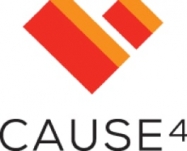



Cause4

Norfolk, United Kingdom
February 2016
Management consultant - nonprofits
Service with Minor Environmental Footprint
Netherlands The,
United Kingdom,
United States
Cause4 champions disruptive philanthropy and new ways of scaling up charities and social enterprises supporting them to change and grow. A small team but with big ambition and a big heart, it’s not the size of project that matters to Cause4 but whether it can make an impact. Provoking change is at the heart of our mission. Cause4 works in partnership with corporations, charities and people to develop important charitable projects, create new business models, as well as to raise vital funds. Learning lessons from the private sector to benefit not-for-profit organisations, since set up in May 2009, Cause4 has raised over £46 million for clients, and is committed to helping attract the best graduate talent to work on some of the world’s most pressing issues. Cause4 wants charities and social enterprises to become more business-minded; and businesses and corporate leaders to become more socially-minded. They believe that if these two sectors can meet in the middle, then everyone will see the greatest possible innovation in addressing issues of social need and challenge, allowing for huge impact in addressing some of the most intractable social problems in the world today, at a global and local level.
Overall B Impact Score
Governance 21.5
Governance evaluates a company's overall mission, engagement around its social/environmental impact, ethics, and transparency. This section also evaluates the ability of a company to protect their mission and formally consider stakeholders in decision making through their corporate structure (e.g. benefit corporation) or corporate governing documents.
What is this? A company with an Impact Business Model is intentionally designed to create a specific positive outcome for one of its stakeholders - such as workers, community, environment, or customers.
Governance 21.5
Governance evaluates a company's overall mission, engagement around its social/environmental impact, ethics, and transparency. This section also evaluates the ability of a company to protect their mission and formally consider stakeholders in decision making through their corporate structure (e.g. benefit corporation) or corporate governing documents.
What is this? A company with an Impact Business Model is intentionally designed to create a specific positive outcome for one of its stakeholders - such as workers, community, environment, or customers.
Workers 30.3
Workers evaluates a company’s contributions to its employees’ financial security, health & safety, wellness, career development, and engagement & satisfaction. In addition, this section recognizes business models designed to benefit workers, such as companies that are at least 40% owned by non-executive employees and those that have workforce development programs to support individuals with barriers to employment.
Community 21.3
Community evaluates a company’s engagement with and impact on the communities in which it operates, hires from, and sources from. Topics include diversity, equity & inclusion, economic impact, civic engagement, charitable giving, and supply chain management. In addition, this section recognizes business models that are designed to address specific community-oriented problems, such as poverty alleviation through fair trade sourcing or distribution via microenterprises, producer cooperative models, locally focused economic development, and formal charitable giving commitments.
Environment 7.2
Environment evaluates a company’s overall environmental management practices as well as its impact on the air, climate, water, land, and biodiversity. This includes the direct impact of a company’s operations and, when applicable its supply chain and distribution channels. This section also recognizes companies with environmentally innovative production processes and those that sell products or services that have a positive environmental impact. Some examples might include products and services that create renewable energy, reduce consumption or waste, conserve land or wildlife, provide less toxic alternatives to the market, or educate people about environmental problems.
Customers 47.3
Customers evaluates a company’s stewardship of its customers through the quality of its products and services, ethical marketing, data privacy and security, and feedback channels. In addition, this section recognizes products or services that are designed to address a particular social problem for or through its customers, such as health or educational products, arts & media products, serving underserved customers/clients, and services that improve the social impact of other businesses or organizations.
What is this? A company with an Impact Business Model is intentionally designed to create a specific positive outcome for one of its stakeholders - such as workers, community, environment, or customers.